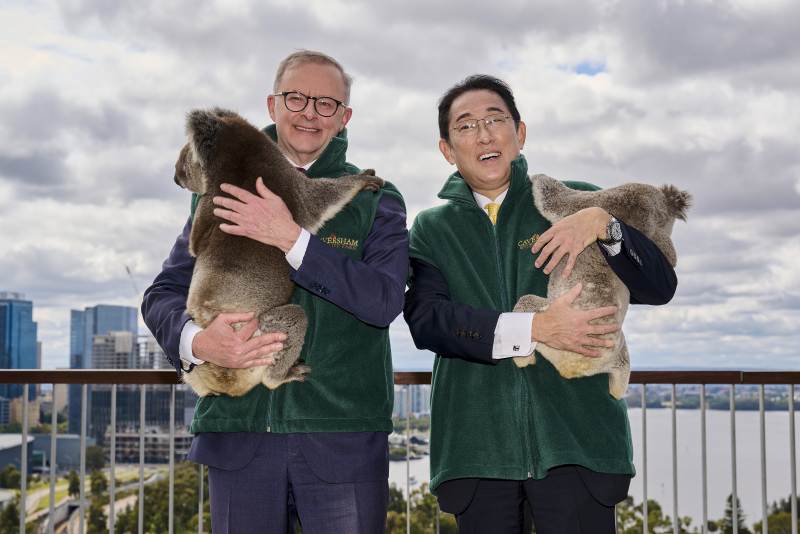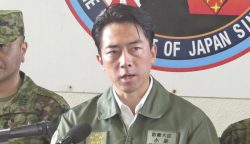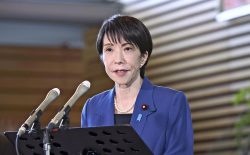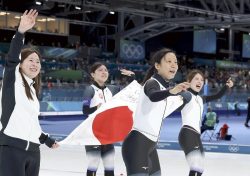New security declaration clearly demonstrates quasi-alliance between Japan, Australia

Prime Minister Fumio Kishida, right, and Australian Prime Minister Anthony Albanese hold koalas during a visit to Kings Park in Perth, Australia, on Saturday.
20:00 JST, October 23, 2022
PERTH, Australia — A new joint declaration by Japan and Australia to deepen their security cooperation has clearly established a quasi-alliance between the two countries.
The move highlights the growing importance of cooperation between Japan and Australia, which share common values such as democracy and the rule of law, as the international order is shaken by a rising China and Russia’s invasion of Ukraine.
“Australia is a central pillar of cooperation among like-minded countries,” Prime Minister Fumio Kishida said Saturday at a summit meeting with his counterpart, Anthony Albanese.
Albanese praised the signing of the declaration, describing the pact as very close to the ANZUS security treaty that stipulates mutual defense obligations among the United States, Australia and New Zealand.
Saturday’s signing of the joint declaration coincided with the end of the Chinese Communist Party’s National Congress. The declaration also called for “a favorable strategic balance that deters aggression and behavior that undermines international rules and norms,” apparently with China and Russia in mind.
Cooperation between Japan and Australia has accelerated because they share the common goal of deterring China.
In March 2007, then Prime Minister Shinzo Abe and then Australian Prime Minister John Howard signed the Joint Declaration on Security Cooperation, which stipulated joint efforts in fields such as counterterrorism. This time, the two countries have stepped up their military cooperation in light of developments related to China and other security issues.
“There is a strong possibility that Australian forces will be involved in a Taiwan contingency,” a senior Japanese Defense Ministry official said. “We will need to prepare based on the scenario of a joint response with the Self-Defense Forces.”
Australia previously emphasized economic ties with China. However, relations cooled when Australia sought an independent probe into the origins of the novel coronavirus outbreak in 2020, and China responded with overt pressure on Australia, including import restrictions.
It is also concerning that Beijing in April signed a security agreement with the Solomon Islands in the South Pacific, expanding its influence over Pacific island nations.
Albanese and three former prime ministers from Australia attended the state funeral of Abe in September. Albanese has visited Japan twice since assuming office in May, and Saturday’s meeting was his third in-person summit with Kishida.
A senior Japanese government official said, “Japan and Australia have never been more compatible.”
Top Articles in Politics
-

Japan PM Takaichi’s Cabinet Resigns en Masse
-

Sanae Takaichi Elected 105th Prime Minister of Japan; Keeps All Cabinet Appointees from Previous Term
-

Japan’s Govt to Submit Road Map for Growth Strategy in March, PM Takaichi to Announce in Upcoming Policy Speech
-

LDP Wins Historic Landslide Victory
-

LDP Wins Landslide Victory, Secures Single-party Majority; Ruling Coalition with JIP Poised to Secure Over 300 seats (UPDATE 1)
JN ACCESS RANKING
-

Japan PM Takaichi’s Cabinet Resigns en Masse
-

Japan Institute to Use Domestic Commercial Optical Lattice Clock to Set Japan Standard Time
-

Israeli Ambassador to Japan Speaks about Japan’s Role in the Reconstruction of Gaza
-

Man Infected with Measles May Have Come in Contact with Many People in Tokyo, Went to Store, Restaurant Around When Symptoms Emerged
-

Prudential Life Insurance Plans to Fully Compensate for Damages Caused by Fraudulent Actions Without Waiting for Third-Party Committee Review

















